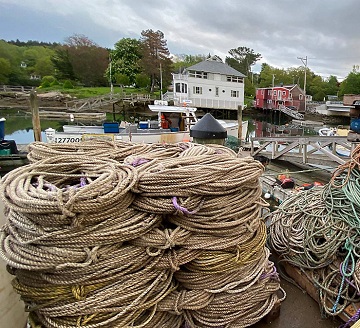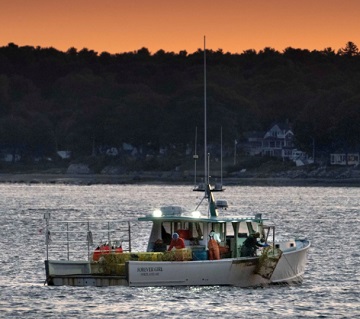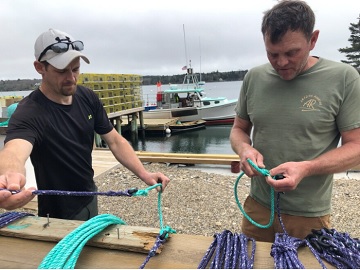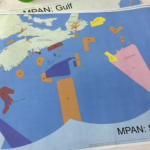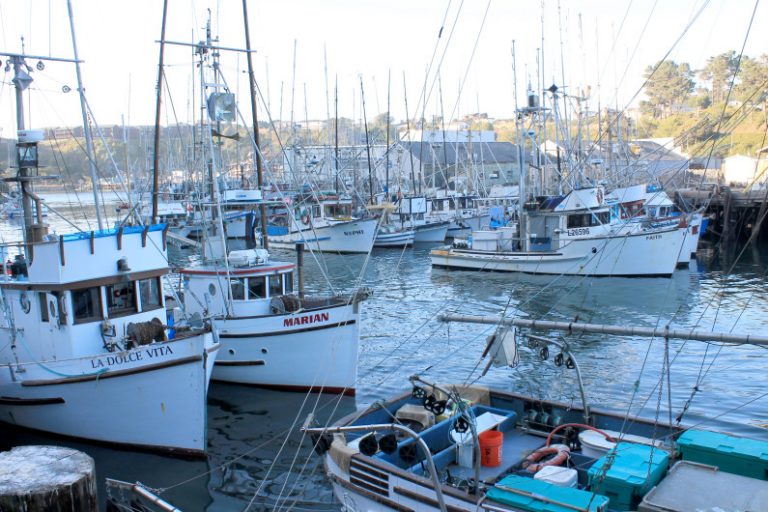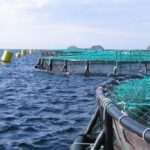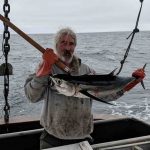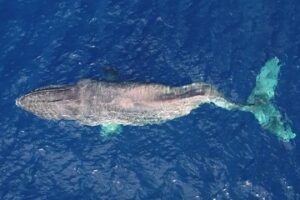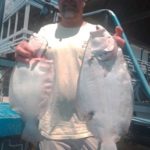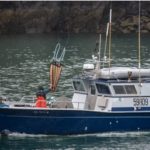Tag Archives: Commissioner Patrick Keliher
Maine lobster industry reacts to right whale found entangled in rope
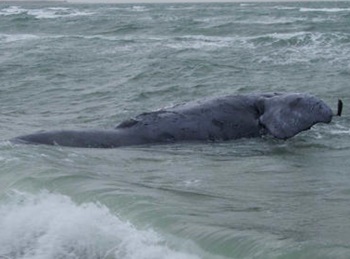 Maine’s lobster industry is responding following the discovery of a dead North Atlantic right whale near Martha’s Vineyard last month. According to federal authorities, the whale was entangled in fishing rope, including portions traced back to Maine. While NOAA has yet to determine the exact cause of the whale’s demise, Maine lobstermen are fearing potential blame. “They’re going to say that the rope, you know, caused harm to the whale, and over time, it just was a very slow death,” said John Drouin, a Lobsterman from Cutler with over 40 years of experience. The incident marks the first documented interaction between a right whale and Maine fishing gear in over two decades. more, >>click to read<< 11:49
Maine’s lobster industry is responding following the discovery of a dead North Atlantic right whale near Martha’s Vineyard last month. According to federal authorities, the whale was entangled in fishing rope, including portions traced back to Maine. While NOAA has yet to determine the exact cause of the whale’s demise, Maine lobstermen are fearing potential blame. “They’re going to say that the rope, you know, caused harm to the whale, and over time, it just was a very slow death,” said John Drouin, a Lobsterman from Cutler with over 40 years of experience. The incident marks the first documented interaction between a right whale and Maine fishing gear in over two decades. more, >>click to read<< 11:49
Maine lobstering gear linked to right whale death for first time
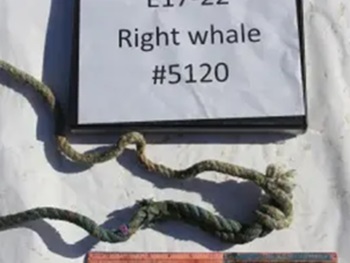 A federal regulatory agency has confirmed that the right whale found dead near Martha’s Vineyard in January had been tangled in Maine lobstering gear. It is the first time Maine gear has been found on a dead right whale, an endangered species. The National Oceanic and Atmospheric Administration Fisheries announced Wednesday afternoon that the female right whale calf found on Jan. 28 near the island off Cape Cod had been injured by gear that has markings distinct to Maine lobstering operations. The link to Maine fishing gear was confirmed by the Maine Department of Marine Resources. Commissioner Patrick Keliher traveled to Massachusetts with department staff to inspect the gear and arrived at the same conclusion. more , >>click to read<< 15:37
A federal regulatory agency has confirmed that the right whale found dead near Martha’s Vineyard in January had been tangled in Maine lobstering gear. It is the first time Maine gear has been found on a dead right whale, an endangered species. The National Oceanic and Atmospheric Administration Fisheries announced Wednesday afternoon that the female right whale calf found on Jan. 28 near the island off Cape Cod had been injured by gear that has markings distinct to Maine lobstering operations. The link to Maine fishing gear was confirmed by the Maine Department of Marine Resources. Commissioner Patrick Keliher traveled to Massachusetts with department staff to inspect the gear and arrived at the same conclusion. more , >>click to read<< 15:37
Maine DMR Receives $17 Million to Support Maine’s Lobster Industry, Improve Flawed Right Whale Data
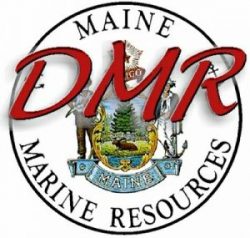 Governor Janet Mills and Department of Marine Resources (DMR) Commissioner Patrick Keliher today announced that Maine has received $17,252,551 from the National Oceanic and Atmospheric Administration (NOAA) to help improve data on endangered North Atlantic right whales (NARW). The money was the result of The Consolidated Appropriations Act passed by Congress in December of 2022 which established a $26 million fund for states with lobster fisheries. This fund is administered by the Atlantic States Marine Fisheries Commission which divided the money among states based on active lobster harvesters. “The goal of this research is to collect data that tells us what is happening in the Gulf of Maine, so we can be protective of whales in a way that also doesn’t devastate Maine’s critically important lobster industry,” said DMR Commissioner Patrick Keliher. more,>>Click to read<< 16:52
Governor Janet Mills and Department of Marine Resources (DMR) Commissioner Patrick Keliher today announced that Maine has received $17,252,551 from the National Oceanic and Atmospheric Administration (NOAA) to help improve data on endangered North Atlantic right whales (NARW). The money was the result of The Consolidated Appropriations Act passed by Congress in December of 2022 which established a $26 million fund for states with lobster fisheries. This fund is administered by the Atlantic States Marine Fisheries Commission which divided the money among states based on active lobster harvesters. “The goal of this research is to collect data that tells us what is happening in the Gulf of Maine, so we can be protective of whales in a way that also doesn’t devastate Maine’s critically important lobster industry,” said DMR Commissioner Patrick Keliher. more,>>Click to read<< 16:52
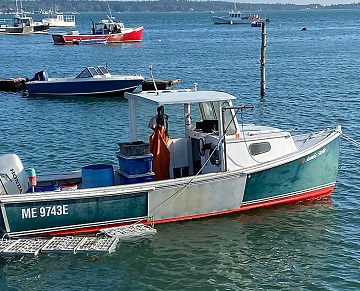
Maine bill to pay lobstermen to test new gear gets initial Senate approval
The bill seeks to set aside $1 million a year for the next two years to help lobstermen comply with federal regulations that could kick-in within six years. Following the Senate vote on Tuesday, bill sponsor Sen. Eloise Vitelli (D-Arrowsic) said federal regulators have “targeted Maine’s lobster industry as a scapegoat.” “The bipartisan fight against these untenable regulations is ongoing,” she said in a statement. “This bill will help make sure that lobstermen are prepared for what might be on the horizon.” Vitelli’s bill, which faces additional House and Senate votes, would provide stipends to reimburse lobstermen for time they spend testing gear. >click to read< 09:05

Lobstermen welcome reprieve on new federal fishing rules but wonder what comes next
The last-minute rider on the federal budget is an unexpected gift to lobstermen and the fishing industry, the kind that can’t be wrapped with a bow and placed under a holiday tree. But for some local lobstermen, the regulatory pause is just a pause, and one more link in the federal chain of regulations targeting lobstermen over right whale entanglements. But Hancock lobsterman and Zone B Council member Zachary Piper said he still gave a sigh of relief at the news.“I gave a sigh of relief, but there’s way more to come,” he continued. “Until they get science to figure out what’s going on and not hide behind an agenda, we’re going to be fighting the same things. This is just a relief from that.” >click to read< 07:46

Message from Commissioner Keliher: Federal Budget Package Includes Pause on Whale Regulations and Needed Funding for Research
Finally, some good news for Maine’s lobster industry. Today, the U.S. House of Representatives followed the lead of the U.S. Senate and voted to approve the omnibus spending bill to fund the federal government. This budget package includes a six-year pause on new federal whale regulations, money to gather needed data including the presence of whales and phytoplankton, and funding for the development of innovative gear technology that will keep the fleet fishing. We expect the President to sign this legislation in the coming days. Here are the major provisions: >click to read< 08:29

Maine to get $1.2 million for lobster gear research and communications tools
Maine’s lobster industry will benefit from $1.2 million in federal funding to study the potential impacts of new regulations on fishing gear. The money comes from the National Oceanic and Atmospheric Administration’s Sea Grant American Lobster Initiative. The Maine Department of Marine Resources will get $750,000 to test and evaluate lobster gear modifications that could be required under a proposal from NOAA to protect endangered right whales. Just over $400,000 will go to the Gulf of Maine Lobster Foundation to provide lobstermen with on-board computers, sensors and other technology to help them collect data and images. >click to read< 08:32
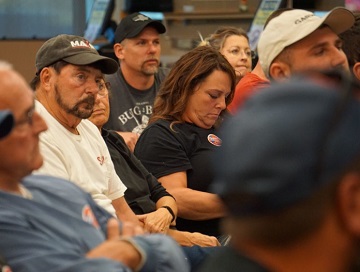
Fishermen reeling as further whale protection measures fast tracked
Maine lobstermen worry that their fate is sealed. Dozens gathered Tuesday evening in the Ellsworth Elementary-Middle School cafeteria for a livestream of a NOAA Fisheries scoping session on modifications to the Atlantic Large Whale Take Reduction Plan. Hundreds more participated online. Spurred by a recent court ruling, federal regulators are fast tracking plans to achieve a 90 percent reduction in entanglement risk. “These are measures that are going to really hurt and there were measures that were put forth that look really bad that didn’t come close to 90 percent, so I want people to realize that this is real, that this is coming and it’s not going to be pretty,” said Kristan Porter, president of the Maine Lobstermen’s Association and an Atlantic Large Whale Take Reduction Team member. >click to read< 10:15
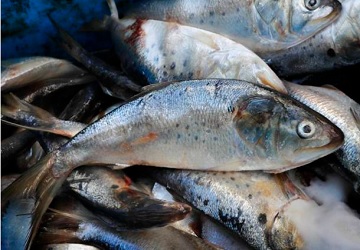
Maine lawmakers approve bill to limit number of pogie fishing licenses
Under a bill passed by the Maine Legislature on Wednesday, the state’s pogie fishery will be closed to all fishermen in 2023 except current license holders who meet certain criteria. To be eligible, fishermen must have held a license to fish for pogies in at least two of three years from 2019-21 and have landed 25,000 pounds in at least one of those years. Those who have the required license history but have not yet met the landings requirement have until the end of 2022 to harvest 25,000 pounds. >click to read< 15:43

Maine: 2021 Lobster Harvest the Most Valuable in the History of the Fishery
According to recently updated data from the Maine Department of Marine Resources, 2021 was the most valuable year in the history of Maine’s lobster fishery. At $724,949,426, the landed value for the iconic fishery jumped by 75 percent over 2020, by far the single largest increase in value, year over year. Of note, the increase in value from 2020 to 2021, $312,464,172, was more than the total landed value in 2009. “The Maine lobster industry remains a cornerstone of our states coastal economy and identity because of the uncompromising commitment to quality that follows every lobster, from trap to table,” said Governor Janet Mills. “I will continue to work tirelessly to support this vital Maine heritage industry.” >click to read< 17:09

Maine: Lobstermen could soon face another new gear regulation
Patrick Keliher, Commissioner of the state’s Department of Marine Resources, says recent research shows that the number of juvenile lobster floating in the water column or settling to the bottom is declining for a third year in a row. Now Keliher says that lobstermen should also consider another new rule to create a “trigger” mechanism for reducing the catch of juvenile lobster when their abundance falls below a certain level. Patrice McCarron, executive director of the Maine Lobstermen’s Association, on Tuesday told members of the Atlantic States Marine Fisheries Commission that fishermen will be “in shock” when they learn about the potential new rule. >click to read< 07:01

Maine: Whale rules, pending lawsuits focus of gloomy Lobster Advisory Council meeting
A complicated and potentially grim future is predicted for the commercial lobster industry, with environmental groups, gear changes, the closure of offshore waters to lobster fishing and judicial rulings painting a “doom and gloom” picture, in the words of Department of Marine Resources Commissioner Patrick Keliher. “I think there’s going to be a lot of moving pieces,” Some of those pieces could spell the end of the commercial lobster fishery in Maine, DMR Deputy Commissioner Meredith Mendelson said, as she ran through the current lawsuits aimed at preserving the North Atlantic right whale. If any or all prevail, the lobster fishery will bear the brunt of the results. >click to read< 08:12
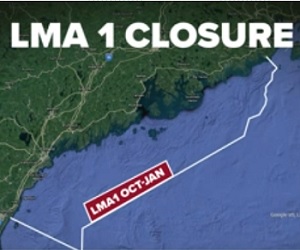
Mills & Keliher Respond to First Circuit Court Decision Reinstating Lobster Fishery Closure
Governor Mills and Department of Marine Resources Commissioner Patrick Keliher issued the following statements today on the U.S. Court of Appeals’ decision to reinstate a 967 square mile fisheries closure off the Maine coast. “This is a deeply disappointing result. This sudden closure will cause significant economic hardship for Maine’s lobster industry,,, Patrick Keliher noted the operational and safety challenges posed by the recent court decisions. “This industry is suffering from whiplash, trying to change plans based on these rapidly evolving court decisions,” said Commissioner Keliher. “Moving gear around 30 miles off-shore at this time of the year also poses a serious safety risk for fishermen. Fishermen’s lives are at stake and NOAA and the courts have an obligation to take fisherman safety into concern when they make these decisions.” >click to read< 08:41

Despite unprecedented 2020 market losses, Maine fishermen brought in history’s 9th most valuable catch
Valued at $516.8 million, the ex-vessel value, or price paid at the dock, of Maine’s commercially harvested marine species was the ninth-highest on record. Maine’s lobster fishery once again accounted for most of the state’s overall landed value, with the lobster catch totaling $405.98 million. While the landed value was down from $491.2 million in 2019 and the 2016 peak of $540.7 million, it was the seventh straight year that the lobster fishery exceeded $400 million. Maine scallop fishermen brought ashore an additional 224,874 pounds compared to 2019, ranking the fishery as the third-most valuable, despite a 19-cent per pound decrease in value. >click to read< 09:12
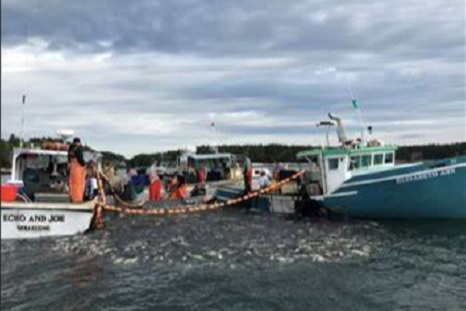
“Networks”: A rare, real look at the lives of lobstermen
“That funny looking water’s moving closer, Brooke,” Wallace says, motioning off in the nearby distance with his head as his hands work on the mooring. “That’s awful funny looking.” “Networks” is Mohnkern’s first film, and it tells a tightly focused story of a group of lobstermen from the Phippsburg village of West Point who hope to catch the shiny, surface-breaking fish known as pogies, or menhaden, causing all the ruckus in the water. It’s a story for the ages, men chasing fish and the consequences of their quest. But in just a few minutes, Mohnkern also manages to tell a story of a community of fishermen coming together for their common good and spotlights the economic impact of the migratory patterns of baitfish. >click to read< 09:32
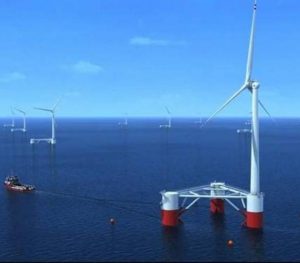
Maine Governor proposes offshore wind farm moratorium
Gov. Janet Mills on Monday proposed a 10 year moratorium (just say no!) on new offshore wind projects in state-managed waters and other actions aimed at calming concerns among the fishing industry about her plan to create the nation’s first floating offshore wind research farm in the Gulf of Maine. In a letter Friday to licensed commercial fishermen, the Democratic governor said she would propose the moratorium to the Legislature. >click to read< 12:38
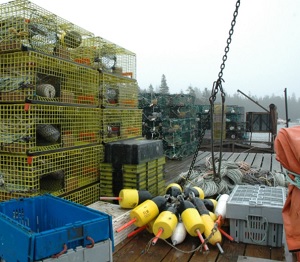
Zone C lobster council OK’s trawl limit plan for new whale protection rules
Zone C Lobster Management Council held a special meeting on the internet in late September to get an update on the situation from Department of Marine Resources Commissioner Patrick Keliher and consider a zone-specific plan for gear modifications that will likely be required by NMFS. On Aug. 19, U.S. District Court Judge James Boasberg gave NMFS nine months to craft new rules to protect endangered right whales from entanglement,,, DMR asked the state’s seven Lobster Zone Management Councils to come up with zone-specific proposals,,, Last week, the Zone C council met to consider the recommendations of its working group. >click to read< 16:07
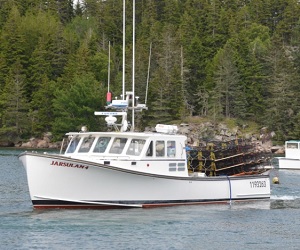
CARES Act: Lobstermen may get up to $50 million in pandemic relief funds
Whatever the relationship between China and the United States — particularly the lobster industry — may be, Maine lobstermen are certainly living in interesting times. Last week, a scant two months before the upcoming presidential election, the U.S. Department of Agriculture announced that it  would soon release some $530 million appropriated by Congress last March under the CARES Act to assist the U.S. seafood industry and fishermen damaged by retaliatory tariffs. Those tariffs have been imposed primarily by China and the European Union on imports of U.S. live and processed seafood. >click to read< 16:58
would soon release some $530 million appropriated by Congress last March under the CARES Act to assist the U.S. seafood industry and fishermen damaged by retaliatory tariffs. Those tariffs have been imposed primarily by China and the European Union on imports of U.S. live and processed seafood. >click to read< 16:58
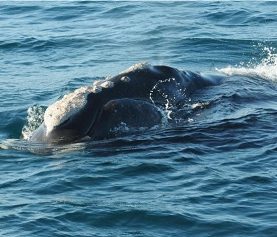
Ruling in whale case signals turmoil for lobster industry
It is too early to know exactly how the ruling in a lawsuit brought by a group of environmental organizations will affect the lobster industry. U.S. District Court Judge James Boasberg asked those groups and NOAA to file briefs suggesting an appropriate “injunctive remedy” against further violations of the Endangered Species Act. Whatever that remedy may be, it is likely to come soon and have a significant impact on Maine lobstermen. During the past several months, Department of Marine Resources Commissioner Patrick Keliher hosted a series of meetings along the coast with members of the lobster industry,, Throughout the process, Keliher warned that the pending federal lawsuit against NOAA was a “wild card” that could affect the regulatory process in undetermined ways. Last week, Keliher said that with the release of the court’s decision the wild card had been played. >click to read< 17:51
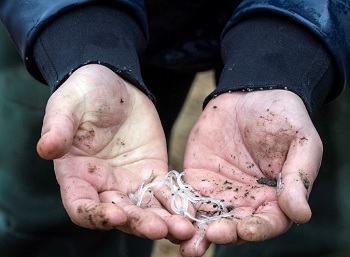
Coronavirus: Elver Season Starts, But Prices Plunge
At 8 a.m., Monday, March 30, about 30 elver fishermen were at the Pemaquid Falls town landing to claim their fishing spots for a shortened season. The elver, or glass eel, season in Maine got off to a late start because of a coronavirus-related delay from March 22 to March 30. Bristol Town Administrator Chris Hall said in a phone interview March 30 that he estimates there were at least 60 fishermen at Pemaquid Falls on opening day last year. The price of elvers has dropped significantly this year, from more than $2,000 per pound in 2019 to $500 per pound, the lowest starting price since 2010. This is down from a price of $2,700-$2,800 at the start of the 2018 season, the highest ever seen in Maine’s elver fishery. photo galley, >click to read< 18:51
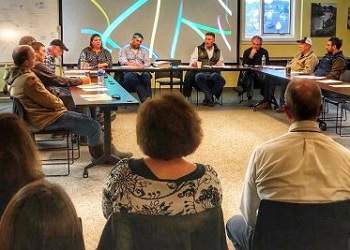
DMR Commissioner Patrick Keliher: NMFS didn’t give the state’s plan credit for all of its whale protections
The state Department of Marine Resources believes that its right whale plan, with its range of lobster fishing restrictions meant to avoid gear entanglements, clocks in right around the 60 percent risk reduction target sought by the National Marine Fisheries Service. Federal regulators – who determined that the state plan reduced risk by just 52 percent – failed to give Maine credit for all its proposed protection measures, as well as those enacted since the last federal right whale review in 2014, Marine Resources Commissioner Pat Keliher said Wednesday. >click to read< 07:15
Maine Lobstermen Dismayed By Fed’s Push For More Gear Changes To Protect Endangered Whale – >click to read<

Marine Resources Committee off to an ambitious start
On Tuesday, the committee scheduled public hearings on two bills submitted on behalf of the Department of Marine Resources. The first, LD1922, would establish a special commercial fishing license for menhaden.,, Rep. Genevieve McDonald (D-Stonington) sponsored LD1922 on behalf of DMR to address possible changes in the way the menhaden fishery is managed. Other bills relating to other fisheries, and other interesting updates,, >click to read< 16:23

New Maine proposal to protect whales, spare lobster fishing
Maine fishery regulators are unveiling a new right whale protection plan they feel will satisfy federal requirements while also preserving the state’s lobster fishery. Maine Department of Marine Resources Commissioner Patrick Keliher says his department’s new proposal would remove 25 percent of the lines beyond an exemption line for inshore fishermen. >click to read<17:16
Maine’s plan to protect right whales will likely affect a minority of lobstermen – “Our goal was to develop a plan that was protective of right whales but is also protective of the economic prosperity of Maine fishermen, and more importantly, for their safety,” said Commissioner Pat Keliher. “We can do that by addressing the risk where it actually occurs.” >click to read<

Maine fishing practices at center of debate about endangered right whale
Hutchings thinks the looming regulations to save the right whale, an endangered species, are only part of the problem with the industry. National Oceanic and Atmospheric Administration is proposing the new rules. He would like to continue fishing lobster for a few more years to be able to say he spent 50 years as a fisherman, but said he feels more financial constraints every year. “I’d hate to be a young guy starting out,” Hutchings said. “ … It (NOAA) should be more worried about the fishermen becoming extinct.” >click to read< 11:49

Maine DMR chief briefs Legislature on whales, bait
Department of Marine Resources Commissioner Patrick Keliher briefed the Legislature’s Marine Resources Committee on the latest news from the lobster bait and whale front. The news was not good. Speaking at a May 7 committee workshop, Keliher said the state was under severe pressure from NOAA Fisheries to find ways to reduce the number of vertical lines in the water that connect lobster traps to surface buoys. NOAA seeks a line reduction of more than 60 percent and wants it done soon. >click to read<11:21

Maine cancels right whale meetings with lobster industry
The state Department of Marine Resources is canceling a series of meetings with the lobster industry next week to talk about right whale protections, saying it has nothing new to present to lobstermen until federal officials clearly identify a risk reduction target. The National Marine Fisheries Service, which is tasked with protecting right whales from entanglement in lobster fishing gear, is introducing new scientific methodologies and analyses that could cause large-scale changes to the lobster industry, Commissioner Patrick Keliher said. >click to read<11:11






